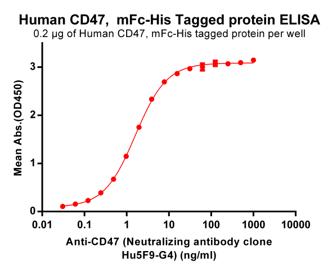Magrolimab: Unveiling the Role of Anti-CD47 in Cancer Research and Beyond
What You Need to Know About Magrolimab
What is Magrolimab?
Magrolimab is an anti-CD47 monoclonal antibody that targets the "don't eat me" signal on cancer cells, promoting their destruction by the immune system.
Is Magrolimab safe?
Magrolimab has shown a manageable safety profile in clinical trials, though side effects such as anemia and infusion reactions have been reported.
What is the mechanism of action for Magrolimab?
Magrolimab works by blocking CD47, a protein that helps cancer cells evade immune attack, thereby enabling macrophages to target and eliminate these cells.
1.) Understanding Magrolimab
Magrolimab is a groundbreaking therapeutic antibody developed to target CD47, a protein frequently overexpressed on the surface of cancer cells. Known as the "don't eat me" signal, CD47 helps cancer cells avoid detection and destruction by the immune system. By blocking this signal, Magrolimab facilitates the immune system's ability to identify and destroy cancerous cells.
Initially developed by Forty Seven, Inc., Magrolimab gained significant attention following its acquisition by Gilead Sciences. The drug has been explored across a range of malignancies, including acute myeloid leukemia (AML), myelodysplastic syndromes (MDS), and diffuse large B-cell lymphoma (DLBCL). Though some trials, like ENHANCE, were discontinued, Magrolimab remains a focal point for ongoing research due to its novel mechanism and therapeutic promise.
Prefer to Listen? Check Out the Magrolimab Podcast Episode
2.) Magrolimab Mechanism of Action
Magrolimab functions by inhibiting CD47, a transmembrane protein expressed on both normal and cancerous cells. CD47 interacts with signal regulatory protein alpha (SIRPα) on macrophages, transmitting a "don't eat me" signal that prevents phagocytosis. By blocking this interaction, Magrolimab reactivates the innate immune system, enabling macrophages to engulf and destroy cancer cells.
This targeted approach has shown promise in hematologic malignancies and solid tumors, particularly when combined with other agents like azacitidine. Preclinical studies suggest that Magrolimab synergizes with these therapies to enhance anti-tumor activity.
3.) Clinical Applications of Magrolimab
Acute Myeloid Leukemia (AML): Magrolimab has been studied extensively in AML, particularly in patients with TP53 mutations, a group with limited treatment options.
Myelodysplastic Syndromes (MDS): The enhance trial explored Magrolimab combined with azacitidine in higher-risk MDS. While discontinued, this research has informed subsequent investigations.
Diffuse Large B-Cell Lymphoma (DLBCL): Ongoing trials are evaluating the efficacy of Magrolimab in DLBCL, highlighting its potential in B-cell malignancies.
Solid Tumors: Early-stage studies have demonstrated the potential of Magrolimab in treating solid tumors by overcoming immune resistance mechanisms.

4.) Advancing Research on Magrolimab with Biosimilars
Biosimilars provide an invaluable resource for advancing research into innovative therapies like Magrolimab. Our Magrolimab (Anti-CD47) Biosimilar Antibody offers a high-quality, research-grade alternative for preclinical investigations.
What is a Biosimilar?
Biosimilars are biologic products designed to be highly similar to approved reference drugs, offering comparable safety and efficacy. They are critical tools in accelerating drug development and expanding access to cutting-edge therapies.

| Magrolimab (Anti-CD47) Biosimilar Antibody | |
|---|---|
| Antibody Type: | Monoclonal Antibody |
| Protein: | CD47 |
| Reactivity: | Human |
How Does the Magrolimab Biosimilar Compare?
Our biosimilar replicates the key characteristics of Magrolimab, providing researchers with a reliable tool to study anti-CD47 therapies. While not approved for clinical use, it serves as an essential resource for laboratory experiments and preclinical studies.
Benefits for Research:
- Enables cost-effective preclinical evaluation of CD47-targeted therapies.
- Facilitates exploration of combination treatments.
- Supports ongoing innovation in immune-oncology.
Research Use Only Disclaimer:
Our Magrolimab (Anti-CD47) Biosimilar Antibody is intended exclusively for research use and is not approved for clinical or therapeutic applications.
Discover Our Biosimilar Range
At Assay Genie, we specialize in providing high-quality biosimilars for research use! Check out our full biosimilar range to learn more.

By David Lee, PhD
Recent Posts
-
Enavatuzumab: Revolutionizing Cancer Research Through Novel Therapeutics
Quick Facts About EnavatuzumabWhat is Enavatuzumab?Enavatuzumab is a monoclonal antibo …17th Dec 2025 -
Alemtuzumab: Mechanism, Applications, and Biosimilar Advancements
Quick Facts About AlemtuzumabWhat is Alemtuzumab?Alemtuzumab is a monoclonal antibody …17th Dec 2025 -
Erenumab: Transforming Migraine Prevention Through CGRP Receptor Inhibition
Quick Facts About ErenumabWhat is Erenumab?Erenumab is a fully human monoclonal antibo …1st Apr 2025



